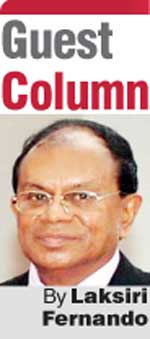Saturday Feb 21, 2026
Saturday Feb 21, 2026
Saturday, 11 November 2017 00:00 - - {{hitsCtrl.values.hits}}
 On 3 July and 23 August, I wrote two articles criticising Wijeyadasa Rajapaksha first “An Open Letter” asking whether he is ‘For Justice or Summary Justice’ and the second saying that he has ‘No Justification to Remain in the Cabinet’. None of those were personal or with any personal animosity but for public interest and to put the historical records straight.
On 3 July and 23 August, I wrote two articles criticising Wijeyadasa Rajapaksha first “An Open Letter” asking whether he is ‘For Justice or Summary Justice’ and the second saying that he has ‘No Justification to Remain in the Cabinet’. None of those were personal or with any personal animosity but for public interest and to put the historical records straight.
In the ‘Open Letter’ my last two paragraphs were the following:
“Let me raise a last point. In your submissions at the beginning of the Salakuna interview you claimed that ‘it was Professor A. J. Wilson who drafted the 1978 Constitution.’ This is completely wrong. I was also surprised why did you make such a claim and then quoted his book ‘The Gaullist System in Asia: The Constitution of Sri Lanka (1978)’ to say that this constitution would end up in anarchy? Perhaps your ignorance.
“Your quotation is correct, but your claim about his authorship of the constitution is wrong. If you again go through his Acknowledgements, you might be able to dispel your misunderstanding. In July 1978, he was asked to comment on the Draft Constitution. I was very close to him at that time. He was extremely polite, but his advice was not taken into proper consideration in finalising the constitution. The constitution was promulgated in September 1978. Please don’t blame him directly or indirectly for this obnoxious constitution.”
Without heeding to this saner advice, he has repeated his accusation that Professor Wilson was the drafter of the 1978 constitution in his latest article titled “Constitutional Assembly unconstitutional, null and void ab initio” in The Island (1 November 2017). Referring to certain legal obstacles in enacting a new constitution under the Soulbury constitution he said the following.
“Since there were no such barriers in the constitution of 1972, J. R. Jayewardene entrusted the task of drafting a new constitution to one of his allies Professor Alfred Jayaratnam Wilson, a political science expert and the son in law of late Mr. S. J. V. Chelvanayagam, the leader of the TULF. The draft he made was received with the assent of the cabinet of ministers and then presented to the National State Assembly in terms of Article 51 of the 1972 Constitution.”
Of course if A. J. Wilson was entrusted with the task of drafting the 1978 constitution, it would have been to the credit of him and the constitution would have been different, in my opinion. However it was not the case. Since this is an important historical matter, I opted to consult Mrs. A. J. Wilson (4 November 2017) seeking her opinion who is now living in Ottawa, Canada, at her old age.
The following is the statement she has sent me (9 November 2017) also giving me permission to quote her and her name.
“Professor A.J. Wilson served as a constitutional advisor to Sri Lanka’s President J.R. Jayawardene from 1978-83. Professor Wilson was not involved in the preparation or drafting of the constitution for Sri Lanka. Professor Wilson acted as an advisor to ensure that the Tamil voice and views was expressed and heard in the political process.”
Let me add that Mrs. Wilson was a librarian at the University of New Brunswick and well trained and very professional in her documentation and archival matters. The above statement substantiates what I said previously in my open letter to Dr. Wijedasa Rajapaksha.
I do remember Prof. Wilson’s visit in July 1978 where I met him at his cousin Dr. (medical) Wilson’s place in Colombo. He was asked to comment on the draft. Although we didn’t discuss the draft constitution, I do remember his not so favourable indications about the draft. The other person present at the occasion was Neelan Tiruchelvam.
It is with much sorrow I recollect his last visit to Sri Lanka in July 1983. On that fateful day, when the communal riots were brewing, President Jayewardene sent him a vehicle asking him to go to the airport well before the scheduled time saying that he (President) cannot assure his security! I received a letter written by him at the airport saying ‘Laksiri, I would never come back to Sri Lanka.’ He never did. I relate these events with the hope that Wijeyadasa Rajapaksha would not any longer misinform the public with a communal angle.
If he has any doubts about who drafted the 1978 constitution, he should go to the archives of JRJ and the cabinet office and dig into the material. Or he should ask people who are familiar with the circumstances of drafting of the constitution without circulating blatant misinformation. If he has incorporated this wrong information in his doctoral thesis he should withdraw and apologise to the relevant university.